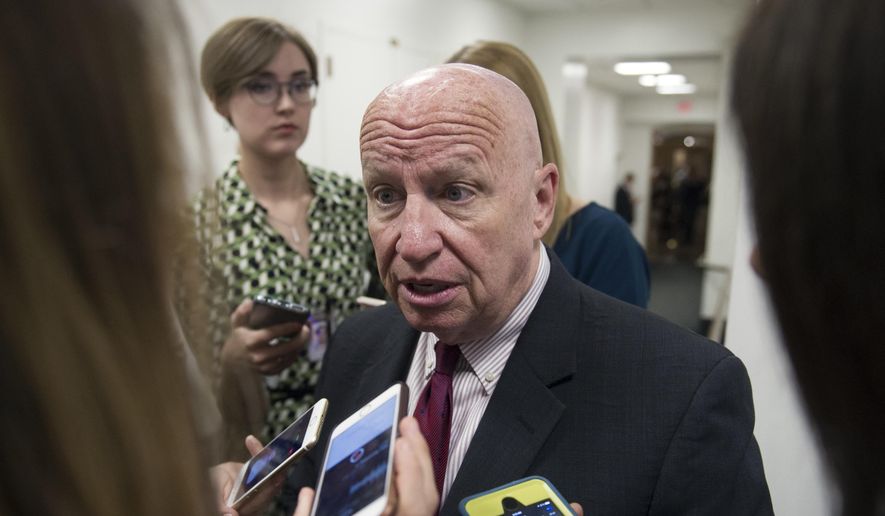A pair of Republican leaders unveiled a plan Tuesday to resume critical Obamacare payments while appeasing the White House and the House GOP with provisions that chip away at the law, including its individual mandate to hold insurance or pay a tax.
The plan by Senate Finance Committee Chairman Orrin Hatch and House Ways and Means Committee Chairman Kevin Brady is an alternative to a bipartisan Senate plan that isn’t sitting well with conservatives, though the new proposal is likely to alienate Senate Democrats whose votes are needed to avoid a filibuster.
Senate Republicans said they were still digesting the new plan, which could complicate Congress’ path to a bill that stabilizes the 2010 health law before another fight over GOP repeal attempts next year.
The GOP-only plan would still fund reimbursements known as “cost-sharing reductions” for insurers, a move designed to tamp down premiums in 2018 and 2019.
Yet it would also provide relief from the individual mandate tax through 2021 and scrap penalties tied to the Obamacare rule requiring large employers to provide insurance to workers, retroactive to 2015. It also lifts the contribution limit on tax-advantaged health savings accounts, and includes strict provisions that bar people from using taxpayer subsidies for abortion.
Mr. Brady said Americans are looking for real relief from Obamacare and “not a reinforcement of today’s failed status quo.”
“What we’re proposing not only helps treat some of Obamacare’s symptoms — rising premiums, fewer choices, and uncertainty and instability,” he said. “It takes steps to cure Obamacare’s underlying illness through patient-centered reforms that deliver relief from federal mandates, protect life, and increase choices in health care.”
The new plan sets up direct competition with a deal negotiated by Sen. Lamar Alexander, Tennessee Republican, and Sen. Patty Murray, Washington Democrat, that would fund the cost-sharing payments and allow states to get swifter approval of waivers that allow them to depart from Obamacare, though within limits. For instance, states cannot chip away at the list of benefits that insurers are mandated to cover — a concession to Democrats.
Republican champions of the Alexander-Murray plan highlighted areas where the plans overlap, saying it proves there is momentum within the GOP for restoring cost-sharing payments that Mr. Trump canceled earlier this month.
Mr. Alexander said he still thinks Congress and Mr. Trump can land a deal before the end of the year, even if Republicans are still undecided about his plan.
“The next step in the legislative process will be for the White House to say what it thinks about [Alexander-Murray], for the House of Representatives to say what it thinks about it,” Mr. Alexander said. “It looks to me it’s the kind of bill that by the end of the year will be discussed by the president and the Senate and the House leaders, so hopefully we’ve given them something to work with.”
Mr. Trump encouraged Mr. Alexander’s efforts during a closed-door luncheon with GOP senators Tuesday, though didn’t offer a full-throated endorsement of the end-product.
“Thanks for your great work on health care. It’s good, it’s good,” he said, according to an aide familiar with the interaction.
Members of both parties have suggested that any Obamacare-stabilization bill will have to be attached to must-pass legislation later on, such as a bill to keep the government open beyond mid-December.
But Senate Minority Leader Charles E. Schumer wants Majority Leader Mitch McConnell to hold a vote on Alexander-Murray now, saying it could pass through on votes from all 48 Democrats and the dozen GOP senators who’ve sponsored it.
“It will get an overwhelming vote. It will then have to be put on the House floor. Speaker [Paul] Ryan will have no choice,” Mr. Schumer said.
Ms. Murray urged GOP leaders to ignore the Hatch-Brady plan and stick to the bipartisan proposal.
“We already know that partisan proposals to take coverage away from millions of people, spike premiums, and inject even more uncertainty into health care markets cannot pass the Senate, and that the agreement Chairman Alexander and I reached on steps to lower families’ health care costs, stabilize markets, and move away from partisan dysfunction on health care can — with a filibuster-proof majority,” she said.
Mr. McConnell wants full buy-in from Mr. Trump and the House before he calls a vote, however, and that’s looking like a tall order.
House conservatives eviscerated the bipartisan Senate plan Tuesday, calling it a “nonstarter” that would make insurers whole but fall short of loosening rules that made coverage more expensive.
Their critiques reflected concerns from Mr. Trump, who’s toggled between supporting bipartisan talks and trying to move the deal to the right, saying consumers need more relief from the 2010 law before they approve the insurer payments.
Rep. Jim Jordan, Ohio Republican, said the Senate shouldn’t be looking to shore up former President Barack Obama’s program after they failed to pass a repeal bill and get moving on the rest of Mr. Trump agenda.
“We haven’t cut taxes yet, we haven’t repealed Obamacare yet, we haven’t started construction on the border-security wall, but we’re now going to bail out insurance companies? You’ve got to be kidding me,” he said at a “Conversations with Conservatives” event hosted by the Heritage Foundation. “So of course we’re opposed to that legislation.”
• Tom Howell Jr. can be reached at thowell@washingtontimes.com.




Please read our comment policy before commenting.